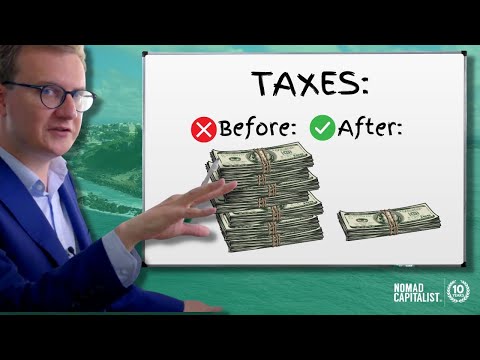US States with the Highest Taxes and How to Avoid Them
October 17, 2023
Many people in the US who live in high-tax states have begun to move to low- or no-tax states. While we understand wanting to lower your tax burden, we don’t really understand the strategy of moving within the US to a state with slightly lower taxes.
In our opinion, if you can make the move from Illinois to Florida, then surely you could go to Puerto Rico – which has much better tax incentives. And, if you can move all the way to Puerto Rico, you can certainly head to a tax-friendly country like Panama or Dominica.
So, if you’re already leaving your family and friends for warmer weather and lower taxes, why stay in the US?
We recommend not moving to Florida if you’re trying to lower your global tax bill. If you live in the US, state income tax is only a small part of the equation since you still need to worry about paying federal taxes.
On top of that, the tax reforms make it even more difficult to move overseas and take advantage of tax reductions like Foreign Earned Income Exclusion.
Regardless, if you’re a US citizen living in a high-tax state, you need to get out as soon as possible – even if it means temporarily moving to a low-tax state.
Read on to find out whether you live in a state where you’re paying way too much in income tax.
Would you like to learn from successful global citizens? Nomad Capitalist Live is the best place to meet and mingle with like-minded freedom seekers and visionaries. You will benefit from invaluable information, access to the experts, and a deeper understanding of the global citizen lifestyle. Sign up for our next live event.
A Note Before We Begin
Let’s set a couple of terms before we delve into the states with the highest taxes.
First, when we talk about the states with the highest taxes, we’re talking about the states with the highest income taxes – not sales tax or any other type of tax.
So, while some states with no taxes might have a higher sales tax or higher gas tax to make up for lost income tax revenue, that’s not what we’re focused on in this article.
That brings me to my second point – most of this article is meant for people earning six figures or more. If you’re making more than $500,000 per year, then paying a few more dollars to fill up your gas tank likely won’t phase you, which is why we’re not too concerned about other types of taxes.
Income tax, however, is another story. If you’re a business owner or investor who makes $1 million or more per year, you’ll likely be paying the highest income tax rate possible.
You’re also not going to be getting that money’s worth in services from the state. While some states with the highest taxes have good social programs, you’re not going to benefit much from them – you’re just footing the bill.
That’s why many high-earners look outside of the US for a tax-free home. In addition to what you pay at the state level, you’re also giving the IRS a sizable chunk of your income.
The Ten States with the Highest Taxes
If you live in one of these ten states, then you’re probably paying far too much in taxes.

California
There’s plenty to enjoy about living in California. Being able to spend a morning skiing in the mountains and then hitting the beach by sunset doesn’t sound too bad, does it?
However, living in the Golden State comes at a cost of a whopping 13.3% of your income if you earn over $1,000,000.
While you may pay a bit less if you’re in the upper six figures, it’s still around 12.3% of your total income. California’s Franchise Tax Board is also one of the most aggressive tax agencies in the world.
Our founder, Andrew Henderson, personally had a few run-ins with the Franchise Tax Board. Despite paying his taxes on time and in full, he has been double-charged by them and had to spend weeks fighting to prove that he did indeed pay my taxes.
California might be an enjoyable place to live for some, but you’ll pay through the nose if you’re a resident of the Golden State.
Hawaii
Hawaii is one of the most popular tourist destinations in the US for good reason. Between gorgeous beaches and near-perfect weather, it’s an ideal vacation spot.
However, while Hawaii is a great vacation destination, you probably don’t want to live there since you’d have to pay the state government 11% of your income.
Unlike other popular tourist destinations like the Bahamas or St. Kitts, Hawaii charges its residents a substantial income tax. It’s also one of the few places where the cost of living affects everyone, even if you’re making $1 million or more.
While you can easily afford to live there if you’re earning six or seven figures, paying $4.32 for half a gallon of milk might make you wonder if your hard-earned money could be better spent elsewhere.
The astronomical cost of living in Hawaii is also driving out middle-class professionals like teachers, which could cause problems for everyone in the state, regardless of how much you make.
If you dream of island life, we would skip Hawaii and get a tax-free second residency in the Caribbean.
Oregon
If you love the outdoors, then chances are you’ve thought of moving to Oregon.
State and National Parks are a dime a dozen, and even if you live in a city, you can ride your bike just about everywhere.
Unfortunately, it ranks number three among the states with the highest taxes since top earners pay 9.9% of their annual income to the state.
While Oregon’s progressiveness can be appealing when it comes to issues like renewable energy, it also means that as a high-income individual, you end up footing the bill for these progressive policies.
Oregon has also begun to pursue offshore income more aggressively. Although the state is primarily targeting large multinational corporations now, there’s a chance that this renewed vigor could extend to your offshore strategy, too.
Even if you don’t plan on moving out of the US straightaway, we would recommend getting out of Oregon soon if you’re trying to go offshore.
Minnesota
In most aspects, Minnesota is decidedly middle-of-the-road. It doesn’t have the curb appeal of California or Hawaii, but it’s a relatively pleasant state with a growing economy.
However, while the Land of 10,000 Lakes might be a nice place to visit in the summer, its income tax rate of 9.85% means that you probably don’t want to actually live there.
Minnesota’s income tax has been steadily rising for years, and it’s now the state with the fourth-highest income tax rate in the country.
The state’s tax future doesn’t look too promising, either.
Governor-elect Tim Walz has made his willingness to raise taxes known. He’s already proposed an increase to the state’s gas tax, and he’s noted that he would be willing to raise other taxes to pay for different programs that he’s proposed.
Iowa
Of all of the states on this list, Iowa seems to be a bit of an outlier. Unlike Oregon or California, it’s not excruciatingly liberal. The state recently cut its high-income tax, so even the state’s wealthiest citizens have had some relief.
Yet, it still collects 6% of many of its residents’ income in taxes every year. In fact, you only need to be making $70,000 per year to fall into the state’s highest tax bracket. Property taxes are also high.
New Jersey
New Jersey’s income tax rate sits at 10.7% for the state’s highest earners and among the top high-tax states to avoid as much as possible.
Property taxes, which also disproportionately impact high-income individuals, in the state are among the highest in the country, so if you own a home in New Jersey, you’re probably already paying more than your fair share of taxes.
Despite its high taxes, the State of New Jersey still isn’t fiscally sound. The state has been wrangling with budget deficits for over a decade, and its problems have only continued to grow.
This means that tax increases are likely on the horizon, so if you’re living in New Jersey, then you may want to start packing your bags.

Vermont
Vermont gave us Bernie Sanders, one of the most vocal tax enthusiasts in the country, so it’s only fitting that it has one of the highest income tax rates in the country.
If you live in Vermont and make over $213,150 per year, you’re giving 8.75% of your income to the state government.
Vermont’s tax rates also may rise in the near future, an unsurprising fact given its representatives.
As potential budget shortfalls loom, the state may end up raising taxes, and, as always, high-income individuals will likely bear the brunt of this increase.
District of Columbia
If you live in the capital of the United States, then you’re paying higher income tax than most of the rest of the country.
As of May 2022, the District of Columbia increased its individual income tax for high-earning residents from the previous 8.95% to 10.75%, and even if you’re earning as little as $60,000 per year, you still need to shell out 8.5% of your income.
As the capital of the US, the District of Columbia needs the infrastructure to support the thousands of commuters and tourists that visit each day, and it needs to impress officials from other countries.
It’s no wonder why Washington, DC, needs as much tax revenue as possible to survive.
It’s also incredibly dependent on high-income taxpayers to survive. Contributions from high-net-worth individuals make up a significant percentage of the District of Columbia’s total income tax revenue.
So, if you’re a wealthy individual living in DC, don’t expect any tax relief coming your way in the near future.
New York
If you’re a fan of big cities, then chances are you’ve thought of moving to New York City.
However, you may think twice after seeing how much tax you actually have to pay to live there.
The State of New York takes 10.9% of its wealthiest residents’ income, and that’s not including city-imposed income taxes in the Big Apple.
New York’s Department of Taxation and Finance is also difficult to deal with. Like California’s infamous Franchise Tax Board, the State of New York is unrelenting when it targets you or your business, even if you already paid your dues.
The only saving grace of New York’s tax system is that the 10.9% rate only applies to individuals earning $25 million or more. If you’re making between $215,400 and $1,077,550, then you only need to pay 6.85%.
That’s still more than you should be paying, but it’s better than the other places on this list.
Wisconsin
Like Iowa, Wisconsin’s place on the list of states with the highest taxes comes as a bit of a surprise.
Although the state isn’t firmly conservative, you would think that the home of Paul Ryan, Former Speaker of the United States House of Representatives, a major proponent of cutting income taxes, wouldn’t fall on this list.
However, the State of Wisconsin taxes its wealthiest residents at a rate of 7.65% of their yearly income.
The future of taxes in Wisconsin also isn’t so promising.
While politicians often make campaign promises about not raising any taxes, whether or not their word will hold is another thing.
How to Avoid High-Tax States
Now that you know the states with the highest taxes, you may wonder how to avoid them or get out if you live in one.
Unlike federal taxes, you can’t claim exemptions if you earn income outside of the state, so you’ll ultimately need to move.
However, we don’t recommend simply moving to another nearby state and calling it good. Moving from California to Nevada might help you save a few bucks, but you’re still shelling out your hard-earned income on an annual basis.
To get substantial tax reductions, you’ll need to consider strategies like moving to another country to claim the Foreign Earned Income Exemption and legally use offshore companies to lower your US tax bill.
For some entrepreneurs, moving to Puerto Rico can also be an option, but it is not a cure-all for US taxes.
If you’re in a high-tax state like California or New York, you should start planning your move as soon as possible.
However, it’s natural to have some hesitation about moving somewhere completely different. You might miss the beaches in California or the liveliness of New York City.
The solution to this hesitation is simple: travel.
Take a trip to Thailand or the Caribbean. You’ll quickly find that the beaches in California aren’t that great, and you can live just as close to those superior beaches while paying a fraction of California’s cost of living.
Our motto at Nomad Capitalist is simple: “Go where you’re treated best.”
Would you be going where you’re treated best by hopping over to Nevada or Pennsylvania, or would you be treated best outside of the US?
Our team at Nomad Capitalist can help you determine what path is best for you to help you create your bespoke plan, including tax strategies. Sign up for our Weekly Rundown for exclusive access to hand-picked insights.


Visa-Free Countries for US Visa and Green Card Holders
For high-net-worth entrepreneurs, global mobility is more than a luxury; it’s a necessity. As a US visa or Green Card holder, you enjoy the privilege of being able to travel to numerous countries without the hassle of securing additional visas. Imagine the convenience: jetting off for business deals, scouting new investment opportunities, or sneaking in […]
Read more

10 Easiest Countries to Immigrate to: Passports for Investors and Professionals
The freedoms we enjoy in our so-called ‘borderless’ world are being steadily dismantled. In its place, a complex web of shifting regulations and political anxieties has taken root, affecting long-term planning for global citizens. As established pathways close and new hurdles appear, the definition of an ‘easy’ country to immigrate to is subject to change. […]
Read more

Best Countries to Retire from the UK in 2025
Retirement isn’t what it used to be. It’s no longer just about stepping away from work – for many, it’s an opportunity to start a new chapter on their own terms, with greater freedom, purpose and enjoyment. Turning that vision into reality, especially overseas, takes careful planning and a clear understanding of your options. One […]
Read more






